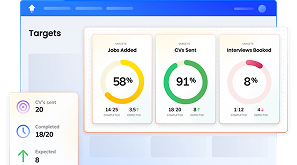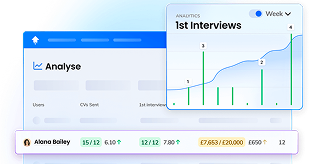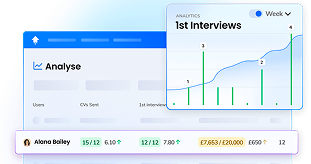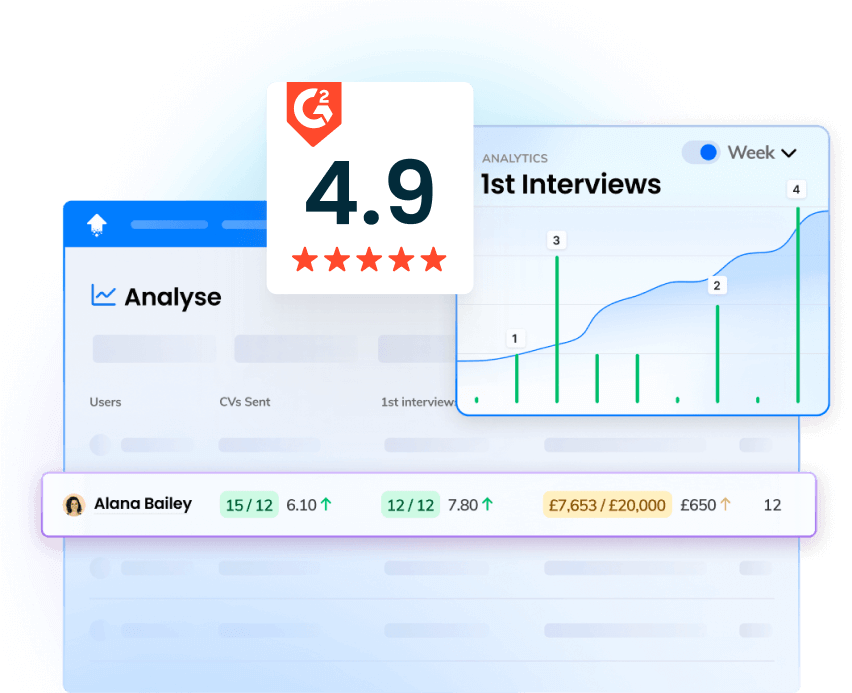In recruitment, happy candidates generally mean happy clients.
And happy clients typically translate to increased revenue for recruitment agencies.
So, how do we ensure candidates experience a positive journey throughout the hiring process?
It starts and ends with candidate relationship management or CRM.
Candidate relationship management is the strategic process of building and maintaining meaningful relationships with job candidates throughout their recruitment journey.
It involves using tools and techniques to engage, communicate, and personalise interactions with candidates, ensuring a seamless and positive experience.
With candidate relationship management, recruiters are empowered to better manage candidate information, track progress, and automate repetitive tasks, enabling a more efficient and tailored approach to recruitment.
This enables them to understand candidate preferences and needs, ensuring candidates feel valued and respected throughout.
All of this means that candidate relationship management plays an absolutely crucial role in creating a positive candidate experience.
And by nurturing relationships, even with unsuccessful candidates, you can strengthen your employer brand and build trust.
Ultimately, a well-implemented system ensures candidates are engaged, informed, and satisfied, improving their perception of the organisation and increasing the likelihood of future collaboration.
Why Candidate Relationship Management Is Essential in Recruitment
Here are three reasons recruitment agencies must invest in their candidate relationship management tools, systems, and processes.
#1 Improving Candidate Engagement
Candidate relationship management systems improve candidate engagement to help recruiters foster better relationships.
This is achieved by enabling personalised interactions through tailored communication and engagement strategies — ensuring candidates feel valued.
By using the best software (like recruiting analytics software OneUp) to gain a deep understanding of candidates' preferences, skills, and career goals, recruiters are able to customise outreach, provide relevant, timely updates, and build trust.
This personal touch strengthens connections and enhances the overall candidate experience.
#2 Enhancing Efficiency
The best candidate relationship management tools now come with handy automation capabilities built in.
These tools handle tedious, repetitive tasks, such as sending follow-up emails, scheduling interviews, and updating candidate records, that in the past would have eaten into recruiters' valuable time.
Indeed, CRM platforms streamline these processes, reducing manual work, boosting accuracy, and enabling recruiters to focus on human-led tasks like building meaningful relationships and sourcing top talent, improving efficiency and overall recruitment outcomes.
#3 Staying Competitive

Knowledge is power, and in 2025, if you're not making data-driven decisions, you're simply not going to be able to stay competitive.
Once upon a time, data analytics was a headache.
Data was often incorrect, irrelevant, and spread across multiple systems.
Collating it all into a single spreadsheet felt like an impossible task, never mind analysing this data and being confident enough to make decisions based on insights.
But with candidate relationship management, you can define clear goals around hiring and candidate satisfaction and employ recruitment analytics tools like OneUp to track your progress.
Benefits of Candidate Relationship Management
You should see myriad improvements when you tap into the power of tools that boost your candidate relationship management capabilities.
Read on for the four main advantages of candidate relationship management.
#1 Centralised Candidate Information
In a recruitment landscape where data is king, it no longer works to have disorganised data scattered across multiple platforms or data silos that produce subpar insights.
Instead, you need one source of truth.
CRM systems centralise candidate data by storing all information — such as resumes, communication history, and interview notes — in a single, easily accessible platform.
This eliminates data silos, ensures consistency, and allows recruiters to quickly retrieve and update candidate profiles.
The result?
Organisation, collaboration, and efficiency throughout the recruitment process.
#2 Streamlined Recruitment Pipelines
A well-organised recruitment pipeline is an effective recruitment pipeline.
With cutting-edge data suites, CRM tools automatically organise candidates into different stages of the recruitment pipeline, such as application, interview, and offer.
This gives you a crystal clear visual pipeline of the recruitment process.
It's then much easier for your recruiters to track progress, identify bottlenecks, and prioritise tasks.
This boosts candidate management, ensuring your recruiters keep them updated and informed while enhancing decision-making and ensuring a streamlined, transparent recruitment process.
#3 Better Candidate Nurturing
Sure, a candidate relationship management system will help you to organise candidate information and stay on top of communication.
But in 2025, they can also perform much of that communication for you.
Indeed, candidate relationship management software can send automated, personalised messages such as interview reminders, follow-ups, and feedback.
Automated nurture cycles ensure consistent communication and keep candidates informed and engaged at key stages of the journey.
Automated follow-ups also reduce manual effort, minimise delays, and create a positive candidate experience by demonstrating attentiveness and professionalism.
And this fosters trust and helps recruiters maintain strong relationships with candidates throughout their recruitment journey.
#4 Data-Driven Insights

OneUp's reporting tools empower recruiters to continuously optimise their strategies.
Connect your CRM, ATS, VoIP and other tools, and OneUp will automatically pull data from across your tech stack to populate custom dashboards and reports.
Its user-friendly interface features intuitive visualisations, making it easy to gain an overview of the candidate journey, as well as how your recruiters are performing.
Vitally, you will also glean key insights into your overall processes and strategies, empowering you to continuously refine the hiring journey.
If you spot an issue on one of your dashboards, simply dig down into the data to discover the root cause of the problem and then take swift action to rectify it.
Alternatively, perhaps you notice that one of your recruiters has a much higher candidate satisfaction score than their colleagues.
You may want to take their techniques, standardise them, and then train the rest of the team for an overall candidate satisfaction boost.
Key Features of Candidate Relationship Management Tools
Getting your candidate relationship management strategies right is vital to the success of any modern recruitment agency.
But there are a lot of tools out there on the market, all with slightly different features and capabilities.
Not every candidate relationship management tool will be right for every agency — for example, huge agencies will need more seats on their account and access to more advanced features, while smaller organisations should prioritise scalability.
However, there are several candidate relationship management features that every agency needs.
These are:
- A centralised database for candidate records
- Pipeline management for tracking recruitment stages
- Candidate segmentation and tagging for targeted outreach
- Automated workflows for email campaigns
- Advanced reporting and analytics for performance insights
How to Use OneUp for Candidate Relationship Management
OneUp boosts candidate relationship management with its cutting-edge reporting and analytics features.
Start by setting SMART goals for your recruiters surrounding candidate relationship management.
SMART goals are:
- Specific
- Measurable
- Achievable
- Relevant
- Time-bound
Here's an example of a CRM goal that is not SMART.
"Respond to candidates more quickly."
Turn this into a SMART goal, and it looks something more like this:
"This quarter, respond to 95% of candidates' queries and applications within four working hours".
Once your goals are in place, you'll need a way to measure them.
Set up custom dashboards and automated reports for each recruiter and each team that monitor metrics relevant to your goals.

The exact KPIs will vary depending on your strategy, but you may consider tracking a combination of the metrics below.
These metrics measure how satisfied your candidates are, how your recruiters are performing in relation to candidates, and how effectively and efficiently your recruitment pipeline is running.
- Candidate Engagement Rate: Measures how actively candidates interact with your communications (emails, calls, etc.).
- Time-to-Hire: The average time taken to fill a position, from job posting to candidate acceptance.
- Candidate Retention Rate: Percentage of candidates who remain engaged or reapply for future positions.
- Conversion Rate: The ratio of candidates who move from one stage of the recruitment process to the next.
- Response Time: The average time it takes to respond to candidates' queries or applications.
- Offer Acceptance Rate: The percentage of candidates who accept job offers.
- Pipeline Health: The number of candidates at each stage of the recruitment funnel.
When your dashboards are set up to track these recruitment metrics, OneUp will automatically populate them with real-time data from across your systems.
It's easy for recruiters and team leaders to see their performance at a glance and hone their tactics and strategies to improve it.
Furthermore, OneUp offers a highly effective gamification suite with live leaderboards, leagues, missions, and automated celebration anthems.

Equipped with these tools, recruitment leaders can launch competitions that motivate their teams to high performance.
To find out more about benchmarking your recruitment metrics, check out our latest industry reports.
Candidate Relationship Management Best Practices
To ensure your candidate relationship management strategy is effective, follow these three best practices:
#1 Personalised Communication
In 2025, the vast majority of communication people receive from organisations is personalised.
With this now, the standard, non-personalised communications can come across as spammy or unauthentic.
But personalising communication for candidates doesn't need to take up any more time than non-personalised messaging.
Indeed, recruiters can use segmentation tools to personalise outreach by categorising candidates based on factors like skills, experience, location, or industry.
This targeted approach allows for more relevant communication, which boosts engagement.
It makes sense.
Would you be more likely to open and reply to a recruitment agency that emails you job openings in your industry and at your level of seniority?
Or one that just sends a round-up of all the open jobs on their books?
By tailoring messages to align with candidates' specific interests and career goals, recruiters demonstrate a better understanding of individual needs.
Segmentation also streamlines hiring efforts, ensuring the right opportunities are presented to the right candidates efficiently.
#2 Maintain Data Accuracy
Making data-backed decisions is crucial to the success of your recruitment agency.
But making data-backed decisions based on inaccurate, irrelevant, or incomplete data sets could set you up for disaster.
This is why it's crucial to regularly update candidate records to maintain accurate and reliable insights.
Up-to-date information ensures that details like skills, experience, and availability reflect current circumstances, enabling more precise matching with job opportunities.
What's more, ensuring your data is up-to-date boosts candidate engagement as it demonstrates that you're paying attention to their evolving career journey.
Overall, regular updates improve database quality, streamline recruitment processes, and help recruiters make informed decisions, leading to better hiring outcomes and stronger professional relationships.
#3 Train Your Team
If your team isn't confident in using your tools, you'll likely end up with inaccurate, incomplete data.
What's more, if they fail to take advantage of automation capabilities, recruiters will also end up wasting their time — and yours!
Train your recruitment team on your tools by providing hands-on workshops, guided tutorials, and role-specific use cases.
Encourage practical exercises to build confidence, and offer ongoing support through resources like manuals or help desks.
It's also important to regularly update training to reflect new features, ensuring the team stays proficient and maximises tool efficiency.
Candidate Relationship Management Tools to Consider
There's a wide variety of CRM tools on the market — and they're rarely one-size-fits-all.
Here are some of the most popular types of CRM tools and examples.
ATS Systems With CRM Features
Not every agency needs CRM-specific software.
As ATS tools become more sophisticated, many incorporate candidate relationship management solutions.
These may be appropriate for smaller agencies or headhunters, where you're filling fewer but more high-value roles.
For example, Teamtailor offers an ATS with CRM features, including sophisticated collaboration tools, task automation, and an AI assistant to draft communications and summarise CVs.
Similarly, Greenhouse is known for its comprehensive applicant tracking system but also offers a wide range of CRM features.
Its candidate experience suite includes easy applications, automated campaigns, video conference apps, self-scheduling, automated hiring team alerts, and tools to help mitigate bias and promote inclusivity from the start of the recruitment process.
CRM-specific Software
Of course, there's also a vast range of dedicated CRM tools on the market.
Beamery, for example, offers a talent lifecycle management suite suited to HR teams at large organisations.
It incorporates generative AI that creates personalised experiences for talent and HR teams, alongside real-time talent insights and tools to unify your skills data.
Another great option for HR and talent acquisition teams, Workable delivers a talent CRM database that allows recruiters to search for and filter candidate profiles easily and then move candidates through the hiring stages.
Other CRM highlights include AI-assisted applicant screening, mobile-optimised applications, and auto-fill options, all in candidates' native language.
Analytics, Automation and Gamification Platforms that integrate with CRMs
Recruitment analytics is central to candidate relationship management, while gamification is highly effective for driving your team's performance.
Meanwhile, automation is a crucial tool when it comes to speeding up your processes, delivering a better experience to candidates and clients, and saving your team time.
OneUp combines analytics, gamification, and automation, making it an essential tool for recruiters looking to boost their candidate relationship management strategy.
Its analytics suite boasts customisable dashboards that allow you to track any metric you need to, with intuitive visualisations that make progress very clear.
Build a report once, and OneUp will automatically populate it with real-time data from across your tech stack, allowing you to get an up-to-the-minute snapshot of your data whenever you need it.
Top tip — automate reports to land in your inbox whenever you're most likely to need them.
Meanwhile, its gamification tools include live leaderboards, leagues, missions, and automated celebration anthems.

Set team competitions with appealing incentives on leaderboards shared to screens around your office.
Then watch as your recruiters strive to beat their colleagues to hit the goal and bag the prize.
Want to encourage more collaboration?
Set up missions where groups of recruiters work together towards the same goal and a shared reward.
And when they hit their goal, a personalised celebration anthem or broadcast will play.
Conclusion: The Future of Candidate Relationship Management
We've established that candidate relationship management tools are absolutely essential in recruitment.
If you want to streamline candidate management, enhance communication, and improve efficiency, investing in these cutting-edge platforms is vital.
The best candidate relationship management tools allow recruiters to build and nurture talent pipelines, personalise outreach, automate candidate relationship management
tasks, and gain valuable insights through data analysis.
Recruitment leaders, meanwhile, are empowered to make data-driven decisions and motivate their teams effectively.
All of this leads to stronger relationships, better hires, and long-term success in a competitive recruitment landscape.
OneUp's advanced data analytics features, automation capabilities, and gamification tools can help your agency excel in the eyes of both candidates and clients.
To discover more about how OneUp can level up your CRM game, book a demo today.



















